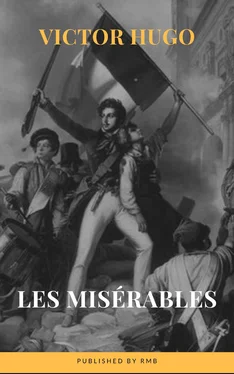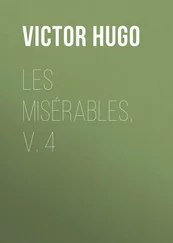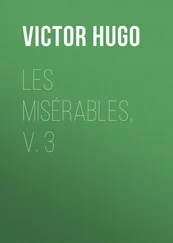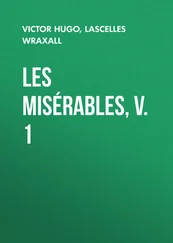The house had not a single door which could be locked. The door of the dining-room, which, as we have said, opened directly on the cathedral square, had formerly been ornamented with locks and bolts like the door of a prison. The Bishop had had all this ironwork removed, and this door was never fastened, either by night or by day, with anything except the latch. All that the first passerby had to do at any hour, was to give it a push. At first, the two women had been very much tried by this door, which was never fastened, but Monsieur de D—— had said to them, "Have bolts put on your rooms, if that will please you." They had ended by sharing his confidence, or by at least acting as though they shared it. Madame Magloire alone had frights from time to time. As for the Bishop, his thought can be found explained, or at least indicated, in the three lines which he wrote on the margin of a Bible, "This is the shade of difference: the door of the physician should never be shut, the door of the priest should always be open."
On another book, entitled Philosophy of the Medical Science, he had written this other note: "Am not I a physician like them? I also have my patients, and then, too, I have some whom I call my unfortunates."
Again he wrote: "Do not inquire the name of him who asks a shelter of you. The very man who is embarrassed by his name is the one who needs shelter."
It chanced that a worthy cure, I know not whether it was the cure of Couloubroux or the cure of Pompierry, took it into his head to ask him one day, probably at the instigation of Madame Magloire, whether Monsieur was sure that he was not committing an indiscretion, to a certain extent, in leaving his door unfastened day and night, at the mercy of any one who should choose to enter, and whether, in short, he did not fear lest some misfortune might occur in a house so little guarded. The Bishop touched his shoulder, with gentle gravity, and said to him, "Nisi Dominus custodierit domum, in vanum vigilant qui custodiunt eam," Unless the Lord guard the house, in vain do they watch who guard it.
Then he spoke of something else.
He was fond of saying, "There is a bravery of the priest as well as the bravery of a colonel of dragoons,—only," he added, "ours must be tranquil."
It is here that a fact falls naturally into place, which we must not omit, because it is one of the sort which show us best what sort of a man the Bishop of D—— was.
After the destruction of the band of Gaspard Bes, who had infested the gorges of Ollioules, one of his lieutenants, Cravatte, took refuge in the mountains. He concealed himself for some time with his bandits, the remnant of Gaspard Bes's troop, in the county of Nice; then he made his way to Piedmont, and suddenly reappeared in France, in the vicinity of Barcelonette. He was first seen at Jauziers, then at Tuiles. He hid himself in the caverns of the Joug-de-l'Aigle, and thence he descended towards the hamlets and villages through the ravines of Ubaye and Ubayette.
He even pushed as far as Embrun, entered the cathedral one night, and despoiled the sacristy. His highway robberies laid waste the country-side. The gendarmes were set on his track, but in vain. He always escaped; sometimes he resisted by main force. He was a bold wretch. In the midst of all this terror the Bishop arrived. He was making his circuit to Chastelar. The mayor came to meet him, and urged him to retrace his steps. Cravatte was in possession of the mountains as far as Arche, and beyond; there was danger even with an escort; it merely exposed three or four unfortunate gendarmes to no purpose.
"Therefore," said the Bishop, "I intend to go without escort."
"You do not really mean that, Monseigneur!" exclaimed the mayor.
"I do mean it so thoroughly that I absolutely refuse any gendarmes, and shall set out in an hour."
"Set out?"
"Set out."
"Alone?"
"Alone."
"Monseigneur, you will not do that!"
"There exists yonder in the mountains," said the Bishop, a tiny community no bigger than that, which I have not seen for three years. They are my good friends, those gentle and honest shepherds. They own one goat out of every thirty that they tend. They make very pretty woollen cords of various colors, and they play the mountain airs on little flutes with six holes. They need to be told of the good God now and then. What would they say to a bishop who was afraid? What would they say if I did not go?"
"But the brigands, Monseigneur?"
"Hold," said the Bishop, "I must think of that. You are right. I may meet them. They, too, need to be told of the good God."
"But, Monseigneur, there is a band of them! A flock of wolves!"
"Monsieur le maire, it may be that it is of this very flock of wolves that Jesus has constituted me the shepherd. Who knows the ways of Providence?"
"They will rob you, Monseigneur."
"I have nothing."
"They will kill you."
"An old goodman of a priest, who passes along mumbling his prayers? Bah! To what purpose?"
"Oh, mon Dieu! what if you should meet them!"
"I should beg alms of them for my poor."
"Do not go, Monseigneur. In the name of Heaven! You are risking your life!"
"Monsieur le maire," said the Bishop, "is that really all? I am not in the world to guard my own life, but to guard souls."
They had to allow him to do as he pleased. He set out, accompanied only by a child who offered to serve as a guide. His obstinacy was bruited about the country-side, and caused great consternation.
He would take neither his sister nor Madame Magloire. He traversed the mountain on mule-back, encountered no one, and arrived safe and sound at the residence of his "good friends," the shepherds. He remained there for a fortnight, preaching, administering the sacrament, teaching, exhorting. When the time of his departure approached, he resolved to chant a Te Deum pontifically. He mentioned it to the cure. But what was to be done? There were no episcopal ornaments. They could only place at his disposal a wretched village sacristy, with a few ancient chasubles of threadbare damask adorned with imitation lace.
"Bah!" said the Bishop. "Let us announce our Te Deum from the pulpit, nevertheless, Monsieur le Cure. Things will arrange themselves."
They instituted a search in the churches of the neighborhood. All the magnificence of these humble parishes combined would not have sufficed to clothe the chorister of a cathedral properly.
While they were thus embarrassed, a large chest was brought and deposited in the presbytery for the Bishop, by two unknown horsemen, who departed on the instant. The chest was opened; it contained a cope of cloth of gold, a mitre ornamented with diamonds, an archbishop's cross, a magnificent crosier,—all the pontifical vestments which had been stolen a month previously from the treasury of Notre Dame d'Embrun. In the chest was a paper, on which these words were written, "From Cravatte to Monseigneur Bienvenu."
"Did not I say that things would come right of themselves?" said the Bishop. Then he added, with a smile, "To him who contents himself with the surplice of a curate, God sends the cope of an archbishop."
"Monseigneur," murmured the cure, throwing back his head with a smile. "God—or the Devil."
The Bishop looked steadily at the cure, and repeated with authority, "God!"
When he returned to Chastelar, the people came out to stare at him as at a curiosity, all along the road. At the priest's house in Chastelar he rejoined Mademoiselle Baptistine and Madame Magloire, who were waiting for him, and he said to his sister: "Well! was I in the right? The poor priest went to his poor mountaineers with empty hands, and he returns from them with his hands full. I set out bearing only my faith in God; I have brought back the treasure of a cathedral."
Читать дальше












